Biography of Phil Collins: A Journey Through Music and Life
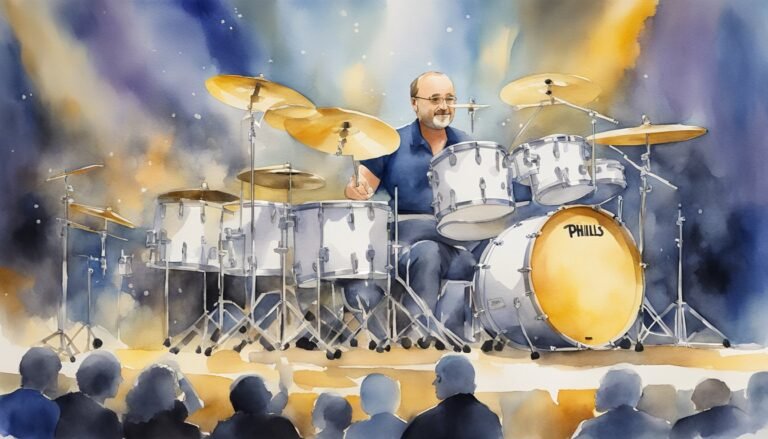
Phil Collins is a household name when it comes to music, known for his impressive talents as a singer, drummer, and actor.
Born on January 30, 1951, in London, England, Collins first found fame as the drummer for the rock band Genesis. His transition to the lead singer role in Genesis marked a turning point in his career, leading to even greater success.
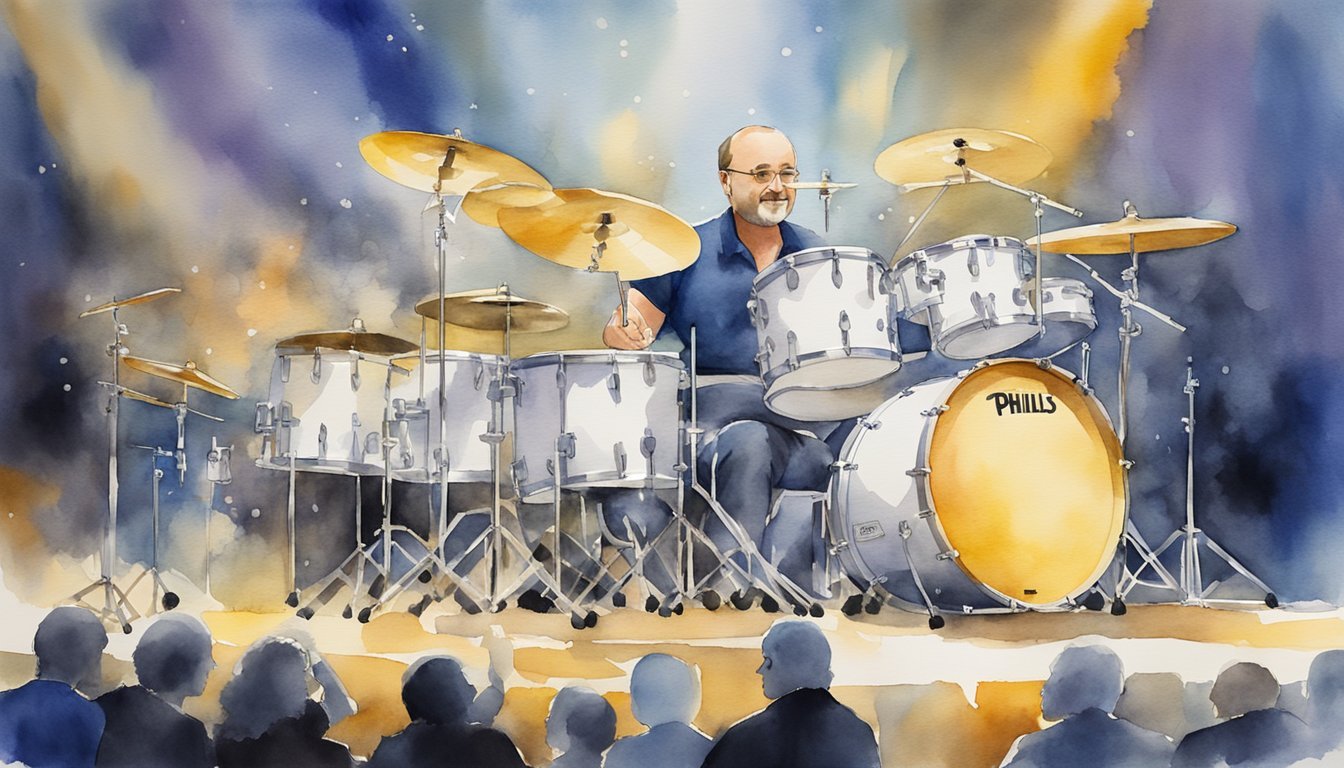
Collins’s solo career took off with a series of hit albums in the 1980s, making him one of the most successful musicians of the decade.
He didn’t just conquer the music charts; he also made his mark in the film industry, both through acting and by creating award-winning soundtracks.
His versatility and dedication to his craft have left a lasting impact on both music and film.
Besides his professional achievements, Collins has had a fascinating personal life and has faced various challenges along the way.
For those curious about the man behind the music, here’s your chance to dive deeper into his incredible journey. 🌟 If you’re on a quest for secret spiritual knowledge, you might want to explore this hidden gem.
Key Takeaways
- Phil Collins started as the drummer for Genesis and later became its lead singer.
- He achieved massive solo success, dominating the charts in the 1980s.
- Collins is also known for his work in film, both as an actor and soundtrack creator.
Early Life and Background
Phil Collins was born in London and showed an early interest in music.
He was especially influenced by drumming from a young age and had notable experiences that shaped his future career.
Childhood in London
Phil Collins was born on January 30, 1951, in Chiswick, a district in West London.
His father, Greville Collins, was an insurance agent, while his mother, June Collins, was a theatrical agent.
Growing up in a bustling city like London exposed him to various cultural influences.
He was the youngest of three children.
Phil’s childhood was typical for the time, filled with activities and the influence of his mother’s theatrical work, which sparked an early interest in acting and performance.
Early Musical Influences
At a very young age, Phil Collins was given a toy drum kit.
By the age of five, he was experimenting with drums, displaying a natural talent.
He received a full drum set by the time he was ten, marking the start of his deep dive into music.
He was also heavily influenced by The Beatles.
Their music inspired him to pursue a professional career in music 🎸.
Collins’ musical journey began here, with consistent practice and a growing passion for rhythm and beats.
His early interest in drumming set the stage for his later achievements.
Formative Years
Phil Collins attended the Barbara Speake Stage School, where he honed his acting and musical skills.
His participation in the arts during these years was crucial in shaping his multifaceted career.
During his formative years, he explored both acting and music.
He played the “Artful Dodger” in the West End production of “Oliver!” These experiences in stage performance complemented his growing prowess as a drummer, helping him build the confidence needed for his future endeavors.
For more intriguing insights into Phil Collins’ life and career, here’s something about secret spiritual knowledge.
Genesis: The Formative Years

Phil Collins played a significant role in shaping the sound and success of Genesis.
His entry into the band, collaboration with Peter Gabriel, and ultimate rise to fame all marked pivotal moments in rock history.
Joining Genesis
Phil Collins joined Genesis as a drummer in 1970.
This happened after he responded to an ad for a drummer who could sing, which he found in Melody Maker magazine.
At the time, Genesis was already gaining some traction, having been formed by Peter Gabriel and Tony Banks years earlier.
Collins’ drumming skills set a new benchmark for the band.
He brought both technical proficiency and a dynamic energy to their live performances.
This fresh talent helped Genesis transition from their early art-rock style to a more complex and captivating sound.
Moreover, Collins’ vocals added a new layer to their music.
Though initially just a drummer, his potential as a lead singer started to be noticed by the band members and fans.
Collaboration With Peter Gabriel
Phil Collins and Peter Gabriel had a special working relationship.
Gabriel was the frontman and primary lyricist, while Collins provided a rhythmic backbone that held the music together.
They collaborated on several iconic songs, blending Gabriel’s theatrical voice with Collins’ impeccable drumming.
Some of their notable collaborations include the albums Selling England by the Pound and The Lamb Lies Down on Broadway.
These albums are considered high points in Genesis’ discography. 🎶
Their teamwork provided a unique mix of progressive rock elements and innovative soundscapes, which set Genesis apart from other bands of that era.
In 1975, when Gabriel left the band, it marked the end of this golden collaborative period.
Read about unusual spiritual methods they explored together here.
Rise to International Fame
After Gabriel’s departure, Phil Collins took over as the lead singer.
This was a turning point for Genesis, shifting their music style from progressive rock to a more mainstream sound.
The move paid off as it helped the band reach new heights of commercial success.
Their albums A Trick of the Tail and Invisible Touch enjoyed immense popularity.
Genesis played sold-out concerts worldwide, earning a spot in the Rock and Roll Hall of Fame.
Collins’ dual role as drummer and lead vocalist made him a standout performer.
His ability to engage audiences with his voice, while also maintaining his drumming prowess, was a rare talent that contributed significantly to the band’s prolonged success. 🥁
Transition to Lead Singer
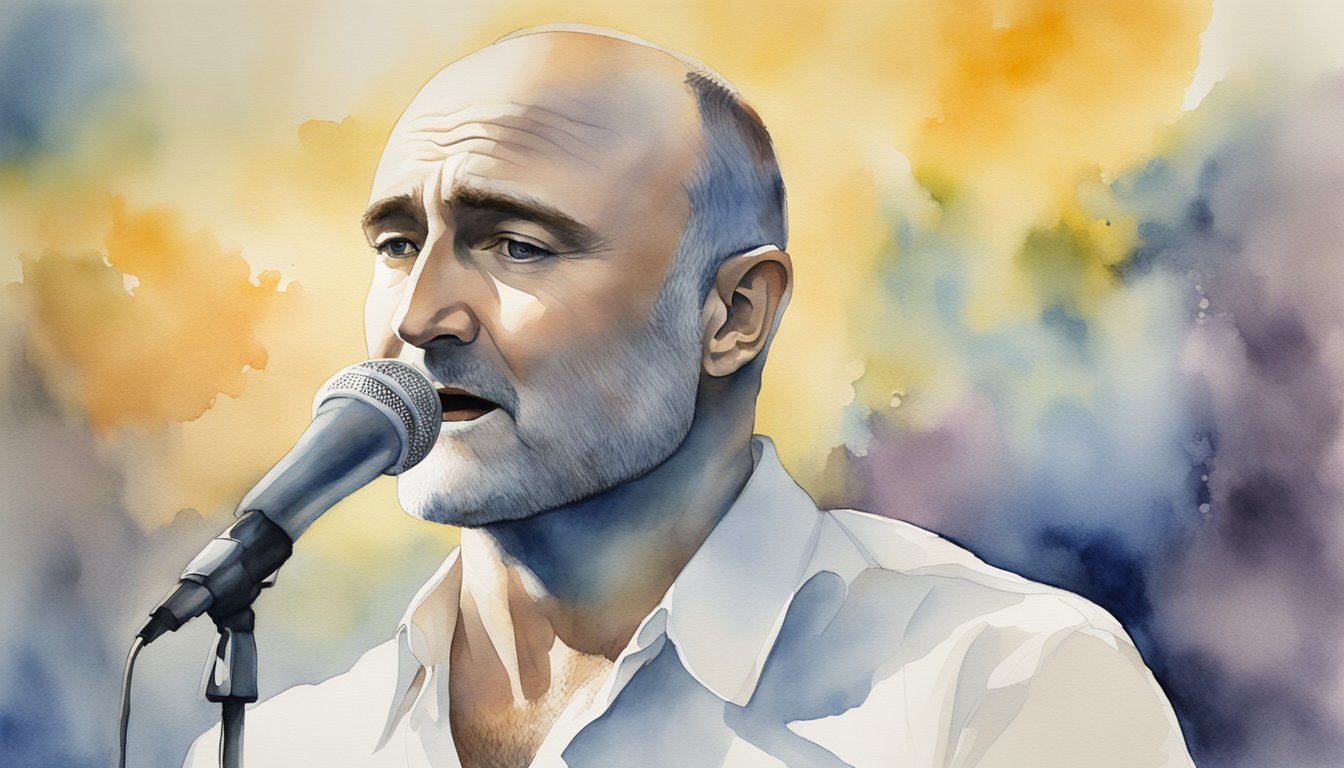
When Peter Gabriel left Genesis in 1975, Phil Collins stepped up as the new lead singer.
This transition marked a significant change for the band, leading to a new era of success.
Taking The Mic
Phil Collins was the drummer for Genesis before becoming the lead singer.
After Gabriel’s departure, the band held auditions to find a new lead vocalist.
Unable to find a suitable replacement, the band turned to Collins, who already had experience singing backup and occasional lead vocals. 🎤
Collins initially hesitated but eventually embraced the role.
His unique voice brought a different sound to the band.
They released their first album with Collins as lead singer, A Trick of the Tail, in 1976, which was a success.
Continued Success With Genesis
After assuming the role of lead singer, Collins helped Genesis achieve greater commercial success.
Albums like Duke (1980), Abacab (1981), and Invisible Touch (1986) featured his distinctive voice and were well-received by both critics and fans. 🥁
Invisible Touch became their first number one album in the U.S., producing hits like “Land of Confusion” and “Invisible Touch.” Collins’ ability to connect with the audience and his dynamic performances played a crucial role in the band’s popularity during the 1980s.
Solo Success and Breakout Albums
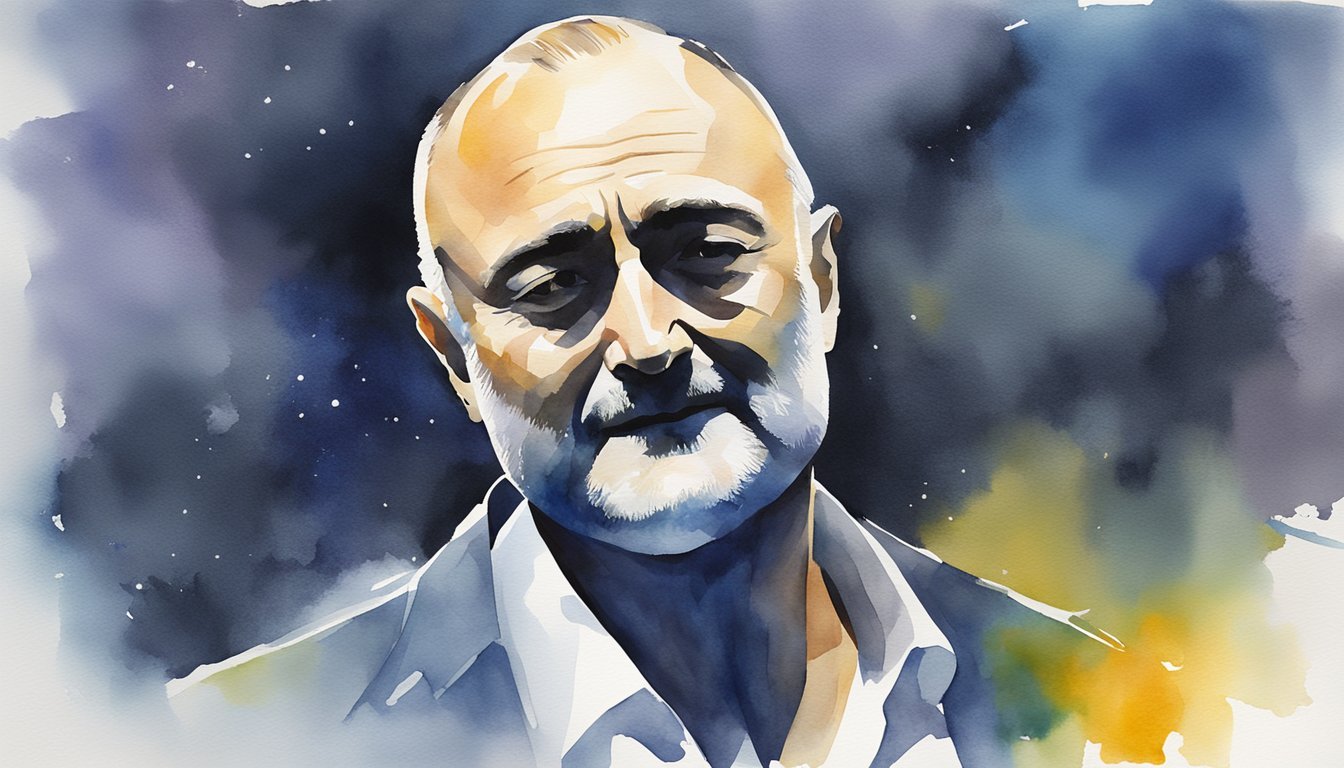
Phil Collins’s solo career saw him achieving major success in the pop music scene, producing several iconic albums and singles that topped the charts and won numerous awards.
Face Value and ‘In The Air Tonight’
Face Value was Phil Collins’s first solo album, released in 1981.
It came on the heels of a painful divorce and is filled with raw emotion.
The standout track, “In The Air Tonight”, became an instant classic.
The song’s dramatic drum break and haunting lyrics resonated with listeners worldwide.
The album marked a significant shift for Collins from his work with Genesis. Face Value wasn’t just popular; it also showcased his talents as a solo artist.
This success set the stage for more solo ventures and deepened his connection with fans.
Commercial Peak with ‘No Jacket Required’
Collins reached a commercial peak with his third solo album, No Jacket Required, released in 1985.
It featured hit singles like “Sussudio” and “One More Night”.
This album reflected his prowess in pop music and widened his appeal.
No Jacket Required won three Grammy Awards, including Album of the Year.
It sold millions of copies globally and solidified his place in ’80s pop culture.
The catchy hooks and polished production made this record a staple on radio and MTV.
Ongoing Musical Achievements
Phil Collins didn’t stop with these successes.
Albums like …But Seriously (1989) and Both Sides (1993) continued to showcase his musical versatility. “…But Seriously” featured hits like “Another Day in Paradise,” which won a Grammy for Record of the Year and addressed social issues through pop music.
Both Sides was more introspective and dealt with personal themes, echoing the rawness of Face Value.
Although it didn’t reach the same commercial heights, it remained a critical success and demonstrated his evolving artistry.
With a legacy marked by iconic tunes and lasting impact, Collins’s solo career is a testament to his talent and appeal. 🌟
Phil Collins: The Actor

Phil Collins didn’t just make his mark in the world of music; he also made a significant impact in film and television.
From on-screen roles to voice acting and soundtracks, his contributions have been memorable.
On-Screen Roles
Phil Collins started his acting career at a young age.
One of his early notable roles was playing the “Artful Dodger” in the West End production of Oliver!.
He was known for his charming performance alongside Jack Wild, who later portrayed the character in the movie.
Another significant role was in the film Buster, where he played Buster Edwards, one of the perpetrators of the Great Train Robbery.
Collins received praise for his portrayal of the complex character.
He also made a memorable appearance in the popular TV series Miami Vice.
His roles in both TV and film showcased his versatility beyond the music industry.
Voice Acting and Soundtracks
Phil Collins didn’t just perform on screen, he also left a mark with his voice acting and soundtracks.
One of his standout contributions is his work on Disney’s Tarzan 🦧 (1999), where he not only provided songs but won an Academy Award for Best Original Song for “You’ll Be in My Heart.”
He also lent his voice to other animated films like Balto and The Jungle Book 2.
These projects demonstrated his talent in conveying emotion through both songwriting and voice acting.
Collins’ deep and smooth vocal delivery brought characters and scenes to life, making his contributions essential to these animated classics.
For further exploration into his unique projects and contributions, you may want to check out this link about secret spiritual knowledge.
Award-Winning Songwriter
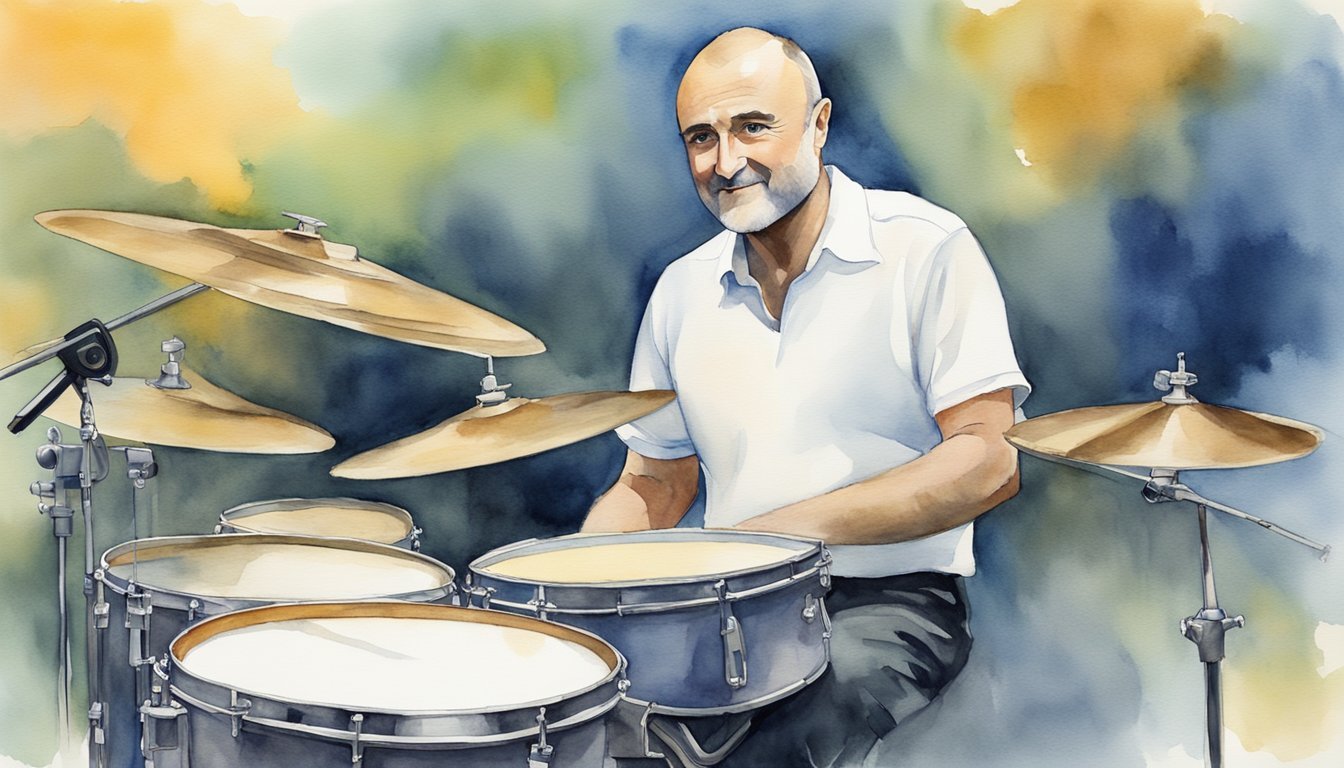
Phil Collins is celebrated for his impressive songwriting, earning numerous prestigious awards throughout his career.
From the Academy Awards to Golden Globes and Grammys, his work has made a significant impact.
Academy Awards
In 1999, Phil Collins won an Academy Award for Best Original Song with his hit You’ll Be in My Heart from Disney’s Tarzan. 🌟 This track not only connected with audiences emotionally but also showcased his ability to write captivating songs for film.
The song remained number one for 19 weeks on the Adult Contemporary chart, solidifying Collins’ reputation in the industry.
His Oscar win highlighted his versatility as a musician and songwriter, seamlessly transitioning from rock to film scores.
Through this achievement, Collins earned global recognition and proved his talent beyond the rock genre.
Golden Globe and Grammy Recognition
Collins has also been honored with multiple Golden Globe Awards and Grammys. You’ll Be in My Heart earned him a Golden Globe in 2000 for Best Original Song. 🌐 This award signified the song’s impact not only within the film industry but also in the music world at large.
In total, Phil Collins has won eight Grammy Awards.
Some of his notable wins include Against All Odds and Another Day in Paradise.
His Grammy success spans various categories, demonstrating his broad musical abilities.
Phil Collins’ accomplishments in both the Golden Globes and Grammys solidify his status as an award-winning songwriter.
He continues to inspire and influence new generations of musicians.
Explore secret spiritual knowledge through this unique resource.
Collaborations and Other Ventures

Phil Collins has worked with many artists and bands throughout his career.
He has been a sought-after producer, and his band projects are notable, including his work with Brand X.
Work With Other Artists
Phil Collins has collaborated with many famous musicians.
He’s played drums for Eric Clapton, contributing to Clapton’s albums and tours.
Collins also worked with Robert Plant from Led Zeppelin, notably on Plant’s solo projects in the ’80s.
In addition, Collins contributed his talents to other artists such as Brian Eno and John Martyn.
Whether playing drums, singing, or providing production skills, Collins’s presence is felt across many genres.
His collaborations extended his reach and influence in the music industry, making significant impacts with his versatile skills.
Music Producing and Band Projects
As a producer, Collins has left his mark on several notable projects.
He produced albums for artists like Frida Lyngstad from ABBA and provided his expertise to various other musical projects.
His role as a producer allowed him to shape the sound and direction of numerous albums.
Phil was also a key member of the jazz-fusion band [Brand X](ph colleague playing innovative and complex music that differed from his work with Genesis.
This side project showed his ability to adapt and excel in different musical genres.
His involvement in many band projects reveals his passion for exploring diverse musical landscapes.
👉 Want to know more about Collins’ spiritual side? Check out this secret spiritual knowledge link!
Personal Life and Family
Phil Collins’ life has been marked by multiple marriages and a large family.
He has been married three times and has five children, including the well-known actress Lily Collins.
Marriages and Relationships
Phil Collins has had three significant marriages.
His first marriage was to Andrea Bertorelli in 1975.
They had one son, Simon Collins, and Phil adopted Bertorelli’s daughter, Joely, from a previous relationship.
His second marriage was to Jill Tavelman in 1984.
Together, they welcomed their daughter, Lily Collins, born in 1989.
This marriage lasted until 1996.
Collins’ third marriage was with Orianne Cevey.
They got married in 1999 and had two sons, Nicholas and Matthew.
They initially divorced in 2008 but later rekindled their relationship in 2016. 💍
Children and Offspring
Phil Collins is the father of five children.
He shares a daughter, Joely, and a son, Simon, with his first wife, Andrea Bertorelli.
With his second wife, Jill Tavelman, he has a daughter, Lily Collins, who has made a name for herself as an actress.
Lily is well-known for her roles in movies and TV series such as “Emily in Paris.”
From his third marriage with Orianne Cevey, he has two sons, Nicholas and Matthew, who are growing up with a keen interest in music, much like their father.
Phil Collins’ children have followed diverse paths, and his large family continues to be a central aspect of his personal life. 🌟
For a deeper exploration of spiritual knowledge, check out this link.
Later Career and Retirement
Phil Collins’ later career was marked by diverse musical directions and a gradual withdrawal from the public eye.
His health struggles also played a crucial role in his decision to step back.
Evolving Music Styles
In the early 2000s, Collins continued to release albums like Testify.
This album included a mix of pop and soul, but it didn’t reach the same commercial success he had in the past.
He explored other musical avenues as well.
Collins participated in various artist collaborations, often blending his classic rock background with new elements. 🎸
Despite not making many new albums, his previous work remained influential.
Songs like “In the Air Tonight” continued to resonate with fans, keeping his legacy alive.
Stepping Back From the Limelight
Health issues began to affect Collins in the 2000s.
He had to undergo surgery on his back and suffered from nerve damage, which made it hard for him to play instruments. 🏥
In 2011, he announced his retirement to focus on his health and family.
However, Collins couldn’t stay away from music for long.
He made a comeback with the Not Dead Yet Tour in 2017, showing his resilience and love for performing.
In 2020, Collins joined a reunion tour with Genesis, although his physical limitations meant he could only sing, not play drums.
This tour was nostalgic for many fans and highlighted his lasting impact on music.
While Collins mostly stepped back from the spotlight, his influence and musical contributions remain strong.
Legacy and Influence

Phil Collins has had an enormous impact on the music world.
As a solo artist, he achieved numerous hits, including seven number-one singles in the US.
His drumming and vocal talents made him a standout figure in Genesis and his solo career.
Collins’ contributions to music have been recognized by many.
He was inducted into the Songwriters Hall of Fame and received a star on the Hollywood Walk of Fame.
His influence spans various music genres and generations.
Phil also made significant contributions to film, notably through his collaborations with Disney.
He composed and performed songs for movies like Tarzan and Brother Bear, earning awards and love from younger audiences.
The impact of his music and career can still be seen today.
Many modern musicians cite Collins as an influence, particularly for his innovative drumming and emotional singing.
Phil Collins’ journey is far from ordinary.
He faced struggles but continued to create and inspire.
His legacy is a testament to his talent and dedication to his craft. 🌟
For those interested in exploring deeper themes behind Collins’ journey, check out secret spiritual knowledge.






